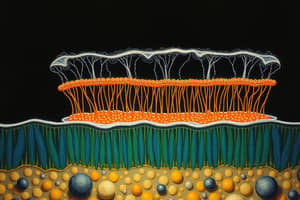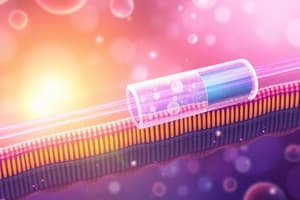Podcast
Questions and Answers
Which process is primarily responsible for the movement of water across a cell membrane?
Which process is primarily responsible for the movement of water across a cell membrane?
- Endocytosis
- Active transport
- Osmosis (correct)
- Facilitated diffusion (correct)
What is the role of the sodium-potassium pump in cellular physiology?
What is the role of the sodium-potassium pump in cellular physiology?
- To promote cell division
- To maintain resting membrane potential (correct)
- To facilitate protein synthesis
- To enhance cell signaling
In which type of transport do molecules move against their concentration gradient?
In which type of transport do molecules move against their concentration gradient?
- Passive transport
- Active transport (correct)
- Diffusion
- Facilitated diffusion
Which organelle primarily regulates calcium ion concentration within the cell?
Which organelle primarily regulates calcium ion concentration within the cell?
What is the primary function of ion channels in cell membranes?
What is the primary function of ion channels in cell membranes?
Flashcards are hidden until you start studying
Study Notes
Cell Membrane Transport
- Osmosis is the primary process responsible for the movement of water across a cell membrane. It involves the passive movement of water molecules from an area of high water concentration to an area of low water concentration, driven by differences in solute concentration.
Sodium-Potassium Pump
- The sodium-potassium pump, a vital component of cellular physiology, actively transports sodium ions (Na+) out of the cell and potassium ions (K+) into the cell.
- This process requires energy and maintains a concentration gradient that is crucial for nerve impulse transmission, muscle contraction, and other cellular functions.
Active Transport
- In active transport, molecules move against their concentration gradient, meaning they move from an area of low concentration to an area of high concentration. This requires energy input, typically provided by ATP.
Calcium Ion Regulation
- The endoplasmic reticulum (ER), a network of interconnected membranes within the cell, plays a key role in regulating calcium ion concentration within the cell. It stores calcium ions and releases them upon specific cellular signals.
Ion Channels
- Ion channels are specialized protein structures embedded in cell membranes that allow the passage of specific ions, such as sodium, potassium, calcium, or chloride, across the membrane.
- They are responsible for generating and transmitting electrical signals in nerve and muscle cells, and facilitate nutrient transport and waste removal.
Studying That Suits You
Use AI to generate personalized quizzes and flashcards to suit your learning preferences.




